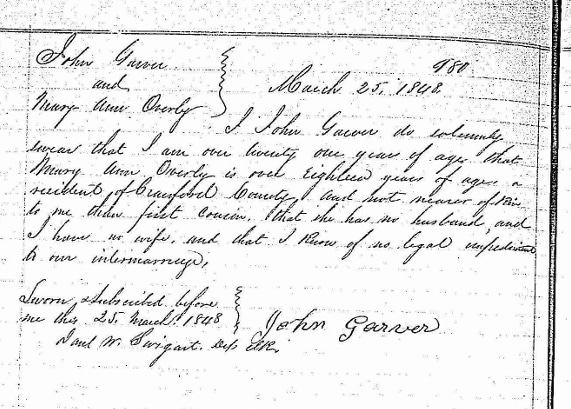Family Stories Collection: This special collection contains a selection of family history stories submitted by our readers. Originally published April 6, 2014.
Recently I found the 1848 Ohio marriage record for my husband’s 2nd great-grandfather, John Garver (1821-1901) and his wife Mary Ann Overly (1829-1890). Often I give these types of records a cursory glance, looking for the names and dates I need—but this time I read the old, handwritten record closely, and it gave me pause.
Here is what the marriage record said:
“I, John Garver, do solemnly swear that I am over twenty one years of age, that Mary Ann Overly is over eighteen years of age, a resident of Crawford County, and not nearer of kin to me than first cousin; that she has no husband, and I have no wife; and that I know of no legal impediment to our intermarriage.” Hold on, wait a minute, run that by me again…
- “…not nearer of kin to me than first cousin.” Wow! What’s closer than a first cousin? Only a brother or sister! So we’re talking about a very loose standard here. But with England’s reigning monarch of the time, Queen Victoria, happily married to her first cousin Albert, who would think anything of it? (Even today, believe it or not, first cousin marriages are still legal in about 25 states.)
- “…that I am over twenty years of age…” As far as being old enough to marry (without parental permission)—that would have been on the honor system, since births weren’t even recorded in most places, not by the civil authorities, until the early 1900s—and so no one would have had a birth certificate to show, or any other form of portable identification, for that matter. I wonder how many brides or grooms lied about their age? I’ve certainly seen plenty of questionable ages given in the records I’ve researched.
- “…that she has no husband, and I have no wife…” How easy it would have been, back in those days, to get away with lying about that one! I wonder how many people, with divorces so hard to obtain, just moved away and started over? It would have been a simple matter of moving to a county or state where no one knew you—and then making sure you kept your mouth shut. If you could get past the part of the wedding ceremony where the officiate asked, “If any person can show just cause why these two may not be lawfully joined together, let them speak now or forever hold their peace”—then you were probably home free!…
It gives a person food for thought!


Actually, double first cousin is closer than a first cousin. I believe that my 2nd great grandparents were double firsts as their fathers were probably brothers and their mothers were sisters.